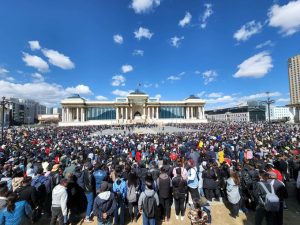Between April 7 and 8, young Mongolians with no political affiliation gathered at Sukhbaatar Square in the capital of Ulaanbaatar for a peaceful protest, demanding the current government change a number of policies. Their messages varied from concerns about the economy to general social dissatisfaction with taxation, job opportunities, allocation of resources, inflation, and an independent judiciary that can provide checks-and-balance for parliamentarian’s financial report.
According to some of the protesters, after the peaceful protest disbursed on April 7, about 20 individuals were caught by the police and beaten. This happened around 4 a.m. Pictures of multiple police officers stomping on an individual went viral, sparking social media outrage. Participants in Mongolia’s youth movement do not believe that the police should use violence to maintain order, especially in a democratic society.
On April 8, more protesters turned out to oppose police brutality, marking one of the biggest peaceful protests among Mongolia’s youth since the beginning of the COVID-19 pandemic. As the crowd, including thousands of students, represents a variety of messages, it’s likely that the older generation will begin to join this developing movement, since many of the economic concerns touch all generations. One protest message stated, “Want to become a producer country not an importer.”
While the youth movement was taking place, the government was organizing an economic forum, which has been canceled two years in a row due to COVID-19. The timing of the two events is serendipitous; however, the government is not taking the youth dissatisfaction lightly. As the protest crowd on April 8 surpassed the previous day, Prime Minister Oyun-Erdene Luvsannamsrai spoke to the youth and agreed to convene an extraordinary session to meet their demands.
Thirty years into democratization, Mongolia has experienced a number of pop-up protests, decrying issues ranging from air pollution, election, mining, economy, and inhumane treatment of civilians. In one of the most notable recent incidents, protests against mistreatment of COVID-19 patients resulted in the shock resignation of the prime minister.
This current protest marks a potent force, because the youth taking to the street are nonpartisan, without any specific political agenda. Many of the protesters simply feel the government is not fulfilling its duties, such as providing economic prosperity, equal job opportunities, health, and wellness for its youth. An overriding demand is to alter government policies in order to promote and support the youth as opposed to the conglomerates that have benefitted from the government for decades.
The voice of the youth and their peaceful protests have historical resonance for Mongolia’s democracy. On April 8, as the sun set on Sukhbaatar Square – where once upon a time, thousands gathered to overthrow socialism in Mongolia – the younger generation of Mongolians sang the national anthem, waving their arms in a peaceful protest.
Update: On April 8, Oyun-Erdene appeared at the Sukhbaatar Square to speak the protestors. Given the current economic uncertainties, in addition to the food insecurity caused by Russia-Ukraine war, the government is indeed feeling the crunch. Time is of the essence.
On the evening of April 8, after convening an irregular session of Mongolia’s Cabinet, the prime minister announced certain measures that were discussed during the session. The protesters have issued 15 demands, including but not limited to 1) control of inflation, 2) release of the peaceful protesters currently detained by the authorities, 3) tightening anti-corruption laws and regulations and making information on small-to-medium enterprise (SME) corruption cases publicly available, 4) limited use of government transportation by officials amid the global energy crunch, and 5) an investigation into the activities of the youth’s center building.
Oyun-Erdene stated that issues concerning taxes, parliament, elections, and social security issues are not the sole responsibility of the Cabinet. Hence, these issues are to be discussed the parliament. At the end of his appearance, the prime minister reiterated the government’s wiliness to collaborate with the protesters and find peaceful solutions to their demands.
Despite the prime minister’s appearance, addressing the protesters’ grievances will be difficult. Much of the youth’s dissatisfaction stems not only from the COVID-related economic recession but from a general dissatisfaction with the country’s development, economic opportunities, corruption, and the bureaucracy that has fueled both public and private sector.
Many of the protestors are college and university students soon to be graduating. Their concerns should be heard. Young Mongolians, active on most social media platforms have unified their voice and concerns, marking a pivotal moment for the Mongolian government to face up to the challenges within the country. All things considered, Mongolia’s democracy lies within its youth and their voice.
































